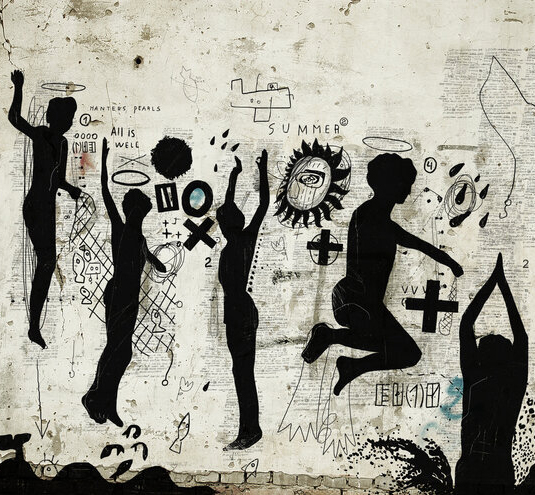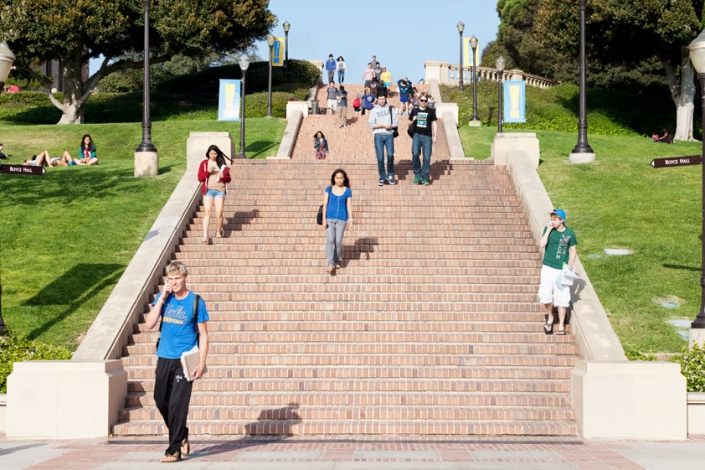College Scholars
Grow with us
College Scholars
Grow with us
The College Scholars Program is an innovative UCLA initiative redefining honors education. Launched in Fall 2018, it draws on UCLA’s strengths as a top public research university to prepare students for 21st-century challenges. Through interdisciplinary coursework, hands-on learning, and a close-knit community, College Scholars gain mentorship, engage in innovative seminars, and shape their academic journey. Designed for first-year students dedicated to academic excellence, the program provides the tools and opportunities to graduate with distinction.

College Scholars students enjoy a small liberal arts college type experience embedded within a world-class research university education. We embrace approaches to learning that prepare you to deal with complexity, diversity, and change.

Within a diverse community of peers, scholars, and mentors who share an innovative spirit and commitment to service, you will be challenged and supported as you discover (or refine) your passions, pursue your goals, and prepare for your future.

Through examining learning and knowledge in relation to an exploration of the self, we prioritize a rigorous academic experience along with the development of qualities that prepare you to serve your communities, our society, and the world at large; cope with life’s inherent discontinuities; and live a personally meaningful life.

To be eligible for the College Scholars Program, you must be:
(a) an entering first-year student (transfer students please apply to the College Honors Program),
(b) pursuing a major course of study in the College of Letters and Science or Luskin School of Public Affairs and
(c) enrolled in a Cluster for the upcoming academic year
If you are not admitted to the College Scholars Program:
Please do not despair! At the end of your first year at UCLA, you may apply to the traditional College Honors Program, successful completion of which will also earn you the “College Honors” designation on your transcript and diploma.
College Scholars is open to first-year students (students who entered UCLA directly from high school). For the 2025–26 academic year, the application will be available from July 1 – September 14.
If you plan to apply, be sure to enroll in a General Education Cluster during Orientation, as completion of a Cluster is part of the program requirements. You’re welcome to apply before officially enrolling in a Cluster—our office will verify eligibility after Orientation.
Are you a continuing UCLA student or a transfer student? Explore College Honors — a flexible and enriching path for students further along in their UCLA journey.
Join us for a College Scholars Application Workshop this summer! These sessions provide an in-depth overview of the program and include a live Q&A.
Workshop Dates (via Zoom):
Thursday, July 31 at 3:00 PM
Wednesday, August 20 at 11:00 AM
Wednesday, September 10 at 3:00 PM
Zoom link for all sessions:
https://ucla.zoom.us/j/94098953288
We look forward to seeing you there!
The first two years of the College Scholars Program experience are grounded in foundational work that supports students’ transition to university thinking, engagement in critical dialogue, exposure to ideological breadth, development of core skills, and exploration of intellectual topics that help them confirm their choice of an academic major. Throughout their first year, College Scholars are introduced to core program elements and expectations through mentor group discussions and activities. They also complete (in winter or spring quarter) a requisite one-quarter Collegium seminar (HC50) during which they establish the e-Portfolio they will use to chronicle their undergraduate careers.
Scholars also participate in a General Education Cluster. These yearlong, collaboratively taught, interdisciplinary, award-winning courses focus on topics of timely importance such as the “evolution of the cosmos and life,” “the history of modern thought,” “work, labor, and social justice,” “frontiers of human aging,” “interracial dynamics in America,” “biotechnology and society,” and “food as a lens for environment and sustainability.” Cluster participation enables students to learn from, as well as network with, faculty who are pioneers in their approaches to learning and research. Upon completing their Cluster, students have fulfilled 18 units toward their degrees, satisfied four General Education requirements, earned Writing II credit, and acquired critical skills in research, writing, and information literacy.
Students’ transition to upper division Honors coursework and programmatic engagements will be supported by participation in leadership development activities. Additional Honors community involvement, coupled with academic coursework, experiential learning engagements, team building activities, study abroad options, and other enrichment opportunities help prepare students for completing their culminating (capstone) projects in an area of their choosing.
3 Honors Collegium courses
Honors Collegium courses, which are developed and offered specifically for honors students through the Honors Programs unit, are a central and longstanding feature of our undergraduate program. Collegium seminars emphasize interdisciplinary learning and offer rigorous educational experiences that are designed to hone your abilities to think critically and creatively, engage you in applying knowledge, and enhance your communication skills. Most of these seminar-style courses enroll no more than 15-20 students, which allows you to get to know your peers and your professors.
3 Experiential Engagements
Experiential engagements provide direct, immersive experiences related to your academic interests or professional goals. Engaging in these activities will help create memorable and meaningful interactions on a deeper level, by providing ‘hands-on’ experience. Please note that experiential engagements must be approved by your counselor. Examples include:
1 Capstone
Capstones are designed to be the culmination of a UCLA undergraduate experience. It may range from a year-long sequence of courses or tutorials, an honors thesis, a comprehensive seminar project, or an internship. Examples include:
3.5 cumulative UCLA GPA
To earn College Scholars, students must maintain a minimum 3.5 cumulative GPA, calculated at the end of their final graded academic term at UCLA. This includes all coursework completed through the last quarter in which letter grades are received.
Beyond Honors Collegium courses, you have a wide range of options for selecting honors-designated coursework that satisfy College Scholars Program requirements. Your academic counselor will help you think through the various options that may enhance your learning and assist with academic program planning at different stages of your undergraduate career.
The Honors Collegium courses, which are developed and offered specifically for honors students through the Honors Programs unit, are a central and longstanding feature of our undergraduate program. Collegium seminars emphasize interdisciplinary learning and offer rigorous educational experiences that are designed to hone your abilities to think critically and creatively, engage you in applying knowledge, and enhance your communication skills. Most of these seminar-style courses enroll no more than 15-20 students, which allows you to get to know your peers and your professors.
Some courses that are offered regularly within academic departments (primarily upper division offerings) also fulfill College Scholars elective requirements. Honors Master List courses are designated as such based on their rigor; a design that promotes interaction between students and faculty; and extensive writing, reading, and/or critical analysis. Departmental honors courses and some upper division research courses are also included.
Honors Contracts are intended to enrich your learning experience by allowing you to pursue individual study beyond what is required of other students in a particular course. With faculty endorsement, you can enroll in a one-unit 89HC (lower-division) or 189HC (upper-division) adjunct to a main course with an agreed-upon (between you and the professor) scope of work.
Honors Seminars are one-unit adjuncts to primary lecture courses at lower and upper division levels. Course number 89 is reserved for lower division courses, and course number 189 is designated for upper division courses. These one-unit (non-“HC”) honors seminars are designed to provide students who are enrolled in a lecture course with opportunity to convene separately with a faculty member in a small-group setting. Seminars explore content beyond that which is addressed in the regular lecture course and discussion section.
Honors credit is offered for completing independent study coursework that engages you in working with faculty on research or other creative projects (i.e., courses numbered 197 through 199). Identify a faculty member you want to work with and inquire whether they are interested and available to supervise your work on a topic of particular interest. If they are, establish an approved research contract that will enable you to enroll in the designated independent study course by (a) concurring with the professor on a meeting schedule throughout the quarter and (b) preparing a summary of the project you will complete.
With approval from the Honors Programs unit, selected internship engagements in supervised community agency or business settings can also be used to fulfill College Scholars requirements. Individual contracts are required for these courses (numbered 95 or 195). Students meet on a regular basis with a faculty member and provide periodic reports of their experience. To earn Honors internship credit, the seminar/tutorial experience must satisfy selected requirements, including a final paper or project.
Need ideas for internship possibilities? In addition to options for students in specific majors, check upper division internship courses offered through the Center for Community Learning. The Career Center’s Handshake platform enables you to search for potential internship (and other employment-related) possibilities. Interested in politics and state or national public policy? Check out UC Center Sacramento and UCLA CAPPP Quarter in Washington D.C.
The PLATO Society of Los Angeles is a community of retired and semi-retired professionals dedicated to lifelong learning. Members meet weekly to explore topics in philosophy, literature, science, politics, and more, with each discussion led by a PLATO member.
Since 1986, the PLATO Society has invited one UCLA College Honors student per group to participate, offering a unique chance to engage in deep discussions with experienced professionals. While PLATO credit does not appear on transcripts or count toward degree requirements, it may fulfill College Honors/Scholars elective coursework.
CUTF seminars, which are sponsored through the Teacher and Learning Center are taught by advanced doctoral students who have considerable teaching experience, who have received excellent prior teaching assistant evaluations, and who are preparing for academic careers. Based on these students’ dissertation research, the roughly 19 CUTF seminars offered annually (enrolling roughly 25 students per seminar) enable undergraduates to learn about new research on a broad range of topics within a dialogue- focused learning environment. Many of these five-unit seminars, which are posted for reference on the Coursework Options page of the Honors Programs site, also satisfy selected General Education requirements.
UCLA offers more than 200 Fiat Lux Freshman Seminars annually as a cornerstone of the undergraduate curriculum. Since the seminars illuminate the many paths of discovery explored by UCLA faculty, the seminars take their name from the motto of the University of California: Fiat Lux — Let There be Light! These one-unit (pass/no pass) seminars, which span the rich array of fields studied at UCLA, provide students and faculty small group settings (average course size is 15 students) to engage in meaningful dialogue on a wide range of topics. A special series of 2020-2021 Centennial Fiat Lux Seminars showcases the university’s signature accomplishments and societal contributions. A max of 2-units may count towards Honors Progress.
USIE offers upper division students the opportunity to develop and facilitate a one-unit (pass/no pass) lower division seminar. Application and selection processes take place each spring quarter. During fall and winter quarters of the following academic year, students who are selected to serve as facilitators work closely with their faculty mentors in two one-unit independent study courses (one each quarter) focused on the content area of the student’s proposed seminar. To help prepare them for leading their spring quarter seminars, student facilitators also enroll in two one-unit pedagogy seminars (one each quarter) in which facilitation techniques are discussed.
Student Voices
College Scholars
Everyone I met was fantastic. Immediately, within Honors, I had this more intimate connection of people that wanted to have direct mentorship with me, and that was really beneficial. It was nice to have somewhere on campus that you walked into and people knew who you were. That became a really nice community that I relied on.

The Honors Program has been an incredible experience that has significantly shaped my career plans, enriched my academic journey, and connected me with a vibrant community. The program’s amazing counseling, abundant resources, and dedicated staff have provided me valuable support. Through this experience, I’ve gained leadership skills, given my understanding of interdisciplinary studies and fostered meaningful connections with peers and mentors. The Honors Program has truly been a cornerstone of my undergraduate experience.

